This is the story of how the modern world fell in love with money
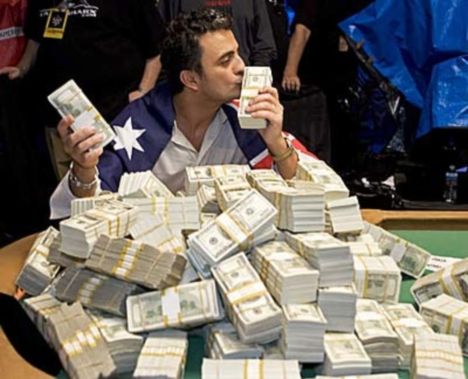
Photo:media.treehugger.com
What is Money? Is it Money Money Money, Must be funny?
Before telling you the story, I invite you to watch this very beautiful video, with its timeless lyrics, words of wisdom, all about MONEY. This, I hope will focus and sharpen our minds on what is to come a bit later, the wonderful Story of Money!
“The value system changed completely. It wasn’t about who you are, but about what you are worth… Morals are completely non-productive in that value system.”
Lauren Greenfield’s Generation Wealth is an epic document of the lives of the super-rich
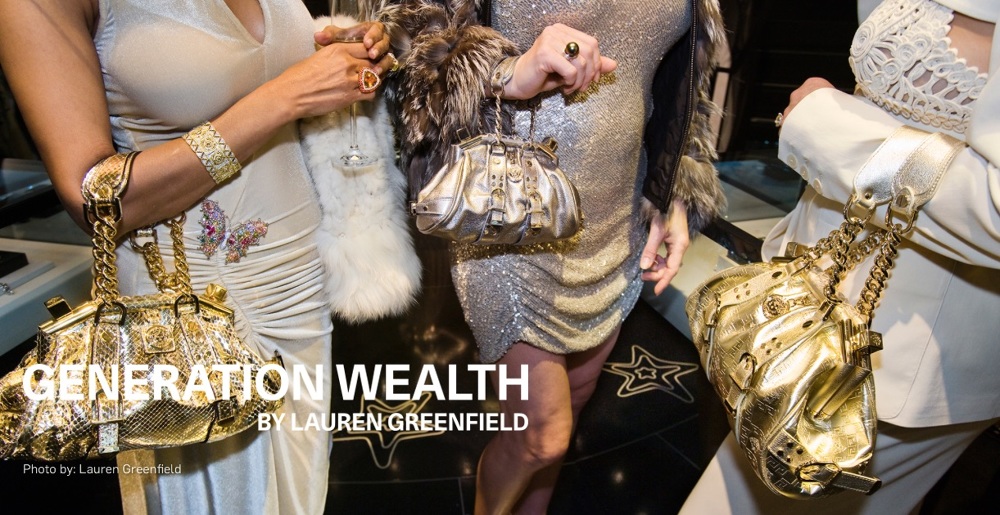
Words by Owen Pritchard
‘Generation Wealth is a 650-page visual history of the world’s obsession with wealth. Today the media is saturated with insights into the lives of the super-rich, where wealth watching has become a form of entertainment and exerts a huge influence over the aspirations of millions of people. The book, bound in gold cloth, contains over 150 interviews with the financial elite the world over – from Russia to China, Monaco to Bel Air.
Photographer Lauren Greenfield has been following the lives of the uber-rich and won a best director award at the Sundance Film Festival in 2012 for her documentary The Queen of Versailles. In Generation Wealth she documents people of all ages, from young girls in beauty pageants, 20-somethings at Vegas pool parties, the new mega rich Chinese businessmen and women, and the ageing Americans who go under the knife in search for eternal youth.
“As Generation Wealth grows up, so does its lifestyle,” writes economist and sociologist Juliet Schor in the foreword. “This goes on to chronicle consumer excess in a world where the wealth accruing to the one percent is virtually unlimited. The consequences are predictable, if spectacular: adults engaged in competitions over homes, cars, boats, jewellery, and those irksome Birkin bags that appear and reappear through the book, getting more expensive by the chapter.”
Lauren’s exhaustive research and dedication places the photographer as an outsider on the inside. Generation Wealth is an exhaustive and giddy document of the zenith of consumer culture, where reality and fantasy merge and people will spend vast sums to shape themselves and the world into their vision. It’s terrifying, fascinating, entertaining and heartbreaking.’
Provoking serious reflection, “Generation Wealth” is not about the rich, but about the desire to be wealthy, at any cost.
“At its best, Greenfield’s work provides a shocking, rigorous, and needed visual language for society’s worst excesses. A decade ago, to visit this world might have seemed like cultural anthropology. It might even have been an optional exercise. Today, in the age of Donald, Melania, and the Mnuchins, it is a necessary, even captivating, task—if, at times, a repulsive one.” – NY Review of Books
“A staggering indictment of materialism.” —Smithsonian Magazine
“Over the last 25 years, Greenfield, who is as much sociologist as photographer, has turned her camera on every imaginable expression of wealth and, as such, is uniquely qualified to comment on our increasingly off-the-rails obsession with affluence.” —Fast Company
See here to read more and buy the book
There is no other way: “We Are Here for the Sake of One Another”
The world needs hope; every person, everywhere, needs hope. HOPE gives us life. HOPE connects us. HOPE fuels us. HOPE moves us. HOPE keeps us. HOPE grounds us. HOPE protects us. HOPE anchors us.
We are not mean people. We have hearts and minds, we care for each other still, we have our dreams, and in dreams begin responsibilities and possibilities.
Hello Fat Cats! Do you fancy a dialogue for the Common Good?
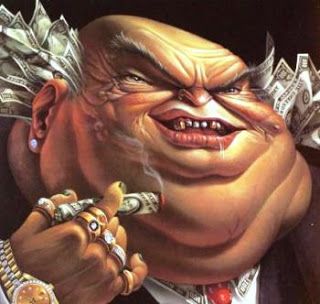
Photo:bing.com
Generation wealth: how the modern world fell in love with money
Words by Rupert Neate
‘The stories Greenfield tells about rich families detached from the world around them, living in bubbles separated from reality by armies of nannies and household staff, chime with my own experiences covering the super-rich as wealth correspondent for the Observer and the Guardian. From Knightsbridge to Monaco, the Upper West Side and the Hamptons, the wealthiest people in society are richer than they’ve ever been before. More of them have five, six, seven or even a dozen homes in the world’s most desirable locations and it is not unusual for them to fly their nannies, tutors and security details between them on private jets. Their houses may cost as much as the £135m a Ukrainian billionaire paid for a penthouse in One Hyde Park, but that doesn’t mean they’ll spend much time there.
The Boltons, a street of grand Victorian mansions in South Kensington, has been an address that only the very well-heeled can afford since the 19th century. But the influx of wealthy Russian and Middle Eastern families to London means prices have gone beyond the reach of all but the very richest of Brits. The average house price is a fraction under £20m – 88 times the UK average – making it the third most expensive street in the country (after London’s Kensington Palace Gardens and Grosvenor Crescent). Over cups of tea and strawberries and cream at the annual church fête held in a private garden square overlooked by the mansions this summer, locals tell me of a disconnected community. “We must be standing on some of the most expensive real estate in the world,” says David, a long-standing member of the St Mary The Boltons congregation, who lives a few streets away. “But you won’t find any of the owners at our fête. You probably won’t find any of them at home from one month to the next.”
A growing number of academics warn that the widening gulf between the richest 1% and everyone else could lead to a backlash. The richest 0.1% of the world’s population has increased their combined wealth by as much as the poorest 50% – or 3.8 billion people – since 1980, according to the World Inequality Report. The report, by the French economist Thomas Piketty and 100 other researchers, also found that the richest 1% of the global population “captured” 27% of the world’s wealth growth between 1980 and 2016. Piketty warns that inequality has ballooned to “extreme levels” in many countries, and will only get worse unless governments take co-ordinated action to increase taxes and prevent tax avoidance.
A four- storey, nine-bedroom house complete with cinema, indoor swimming pool and Japanese garden sold for £51m in 2015 to an offshore company. The stamp duty alone set back the unknown buyer £7.6m. The owner is paying £220,000 a year in extra tax in order to keep their identity a secret.
Greenfield says the true absurdity of extreme wealth hit her when she was documenting the lives of the Siegel family, who were attempting to build the biggest private home in America, for her film The Queen of Versailles. When “timeshare king” David Siegel loses billions in the 2008 financial crisis, the family are forced to travel by commercial jet and one of the children turns and asks, “Mommy, what are all these people doing on our plane?” Greenfield met the Siegels after striking up a friendship with Donatella Versace, whom she met via her work documenting the lives of rich kids in LA. She went back to Crossroads, the $38,000-a-year private school in Santa Monica she’d attended alongside Hollywood’s rich and famous offspring. Greenfield says her position as an “insider and outsider” – she went to the school herself, but her parents (both academics) couldn’t afford to kit her out with the designer bling the other kids had – gave her “exceptional access to the world of the wealthy in LA”.
Greenfield never wanted to become an expert on the rich or pass judgement on their lives or spending. “I wanted to be a guide, to take the viewer on a journey and to help them understand the shift in society.” She admits weeping a few times while putting the book and film together. .
We meet for lunch at London’s five-star May Fair Hotel, surrounded by fellow diners who could easily be her subjects. “The photos are evidence of a sea change in our values over the last 25 years,” she says. “I felt like we had gone from the American dream of opportunity for all to a desire for ever more wealth, in the currency of money, fame, beauty or youth.” She says it’s not just an issue that effects the wealthy, but everyone in society. “We’re all complicit in generation wealth.”
Greenfield interviewed several experts for the film, but just one survived the cut. Former New York Times journalist and leftwing activist Chris Hedges is quoted as saying “Wealth is whatever gives us value” and warns that “Societies accrue their greatest wealth at the moment they face death.” This last remark might trouble Americans in particular: last year Professor Philip Alston, United Nations special rapporteur on extreme poverty, made a statement accusing Donald Trump and the Republican party of consciously distorting the shape of American society in a “bid to become the most unequal society in the world”.
The Leader of the "Free" World!! He Loves Loads of Money!!
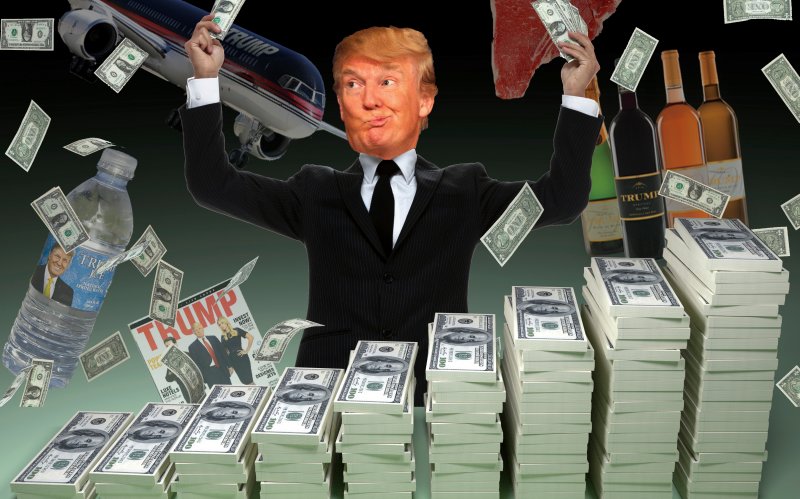
Photo:whistleblower-newswire.com
Alston, who acts as a watchdog on extreme poverty, said Trump’s administration had passed tax laws that “overwhelmingly benefitted the wealthy and worsened inequality”. He said Trump’s policies “seem deliberately designed to remove basic protections from the poorest, punish those who are not in employment and make even basic health care into a privilege”.
But Greenfield says the chasm between rich and poor was widening well before the reality TV star’s 2016 election. “The American dream – that everyone has equal opportunity – became a fiction long before Trump,” she says. “Americans don’t hate the rich, as they imagine they could become the rich. They don’t want high taxes as they think they could become rich and won’t want to pay them. But what they dream of is an increasingly unbelievable fantasy.”
She says that while examining her photos it became clear to her that “We have left behind the American dream of my dad’s generation where there was the possibility of social mobility and the belief that anyone could make it. The things that were valued then – discipline, hard work and frugality – are not so important now. We have a culture that prizes celebrity, bling and narcissism.” Trump, she says, “is the apotheosis of generation wealth. With Trump you have wealth and celebrity achieving the ultimate goal. Trump is the natural evolution of the values of our culture.”
When Greenfield started the photography series – which includes portraits of a 12-year-old Kim Kardashian – getting permission from parents to document their kids’ lifestyles sometimes proved difficult. “The parents wanted to be a little discreet – they indulged in the lifestyle but didn’t necessarily want to be seen doing it, but that has changed,” she says. “I went back again in 2007 and the parents’ attitudes had completely changed. A lot of times parents would be present at the interviews and they would be proud, saying: ‘Our kids are just like Paris Hilton.’”
“‘Keeping up with the Joneses’ has become ‘keeping up with the Kardashians’,” she says as we tuck into seared tuna with caponata and gambas al pil pil. “Instead of wanting the slightly better house down the street, you want the mansion that Kim has. Reality TV and social media has made the lives of the wealthy more accessible, and it has made people hungrier for it.” The children Greenfield met were sometimes more aware of the potential damage created by free flowing cash than their parents. She recalls a 13-year-old called Adam who told her: “Money ruins kids, money has ruined me”.
Greenfield went to Adam’s bar mitzvah and was “blown away” by the scale of the production, including the go-go dancer. “Kids in his circle had to be seen to spend £50,000 on their bar mitzvah or they’re shit out of luck,” she says. Hanging out with Adam affected her more than most of her subjects, because even at 13 he was perceptive enough to know that something had gone wrong. She describes herself as friends with many of her original subjects, including Adam. But he wouldn’t allow her and the cameras back for her latest film.
Neither would David Siegel, 83, the real estate mogul she shadowed in The Queen of Versailles. “He hates the way the film ended when he loses the houses,” Greenfield says. “I don’t think David will ever let me back.” But Siegel’s third wife, Jackie, 52, is still friends with Greenfield and attended the premiere of The Queen of Versailles. “She thinks it’s the best thing she ever did,” Greenfield says. Early on, Jackie, a former Mrs Florida beauty pageant winner, told Greenfield: “You can never be too rich or have big enough boobs.” Jackie’s breasts, which have been augmented four times, fill the frame of one photo.
At the end of the film, Greenfield says the Siegels appeared to have learnt that wealth is not as important as health and happiness. But, having recovered from the financial crisis, the Siegels bought back the house and extended their ambitious plans. The house built on a man-made hill in a gated community in Orlando will have 14 bedrooms, 32 bathrooms, a 30-car garage, bowling alley, five swimming pools (three indoor, two outdoor), a two-storey cinema and a ballroom with capacity for 500 guests. The much delayed house is set to be finally habitable next year.
“They had this realisation that it was family that mattered,” Greenfield says. “Yet they are back at the house building bigger and better. I wonder, did we really learn anything from the financial crash, or did we just go back to the way it had always been? In the US and the UK we fixed a broken system and now the real estate market is even more on fire, the stock market is up and Trump is the president and tax laws are making things even more unequal.”
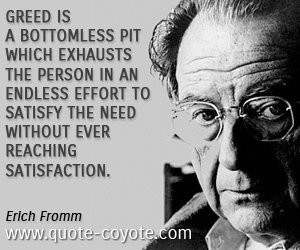
Numerous official reports detail the widening gap between rich and poor. UBS, the Swiss bank which prides itself on advising more uber-wealthy families than any other bank, published research showing that the super-rich hold the greatest concentration of wealth since the time of the Carnegies, Rockefellers and Vanderbilts at the turn of the 20th century. There are now 1,542 billionaires across the world, more than ever before. The richest 500 people alive increased their wealth by 23% last year, taking their combined fortunes to $5.3tn – more than twice the gross domestic product of the UK.
Josef Stadler, the lead author of UBS’s report, says his billionaire clients are aware of the widening gulf between rich and poor and fear that hard-pressed people might rise up and take direct action. “We’re at an inflection point,” he says. “Wealth concentration is as high as in 1905, this is something billionaires are concerned about. The question is, to what extent is that sustainable and at what point will society intervene and strike back?”
He says the “$1bn question” is how society will react to the concentration of so much money in the hands of so few. Anger at so-called robber baron families who built up vast fortunes from monopolies in US rail, oil, steel and banking in the late 19th century, an era of rapid industrialisation and growing inequality in America that became known as the Gilded Age, led to President Roosevelt breaking up companies and trusts and increasing taxes on the wealthy in the early 1900s. “Will there be similarities in the way society reacts to this gilded age?” Stadler asked.
Looking back on her work, Greenfield recalls being startled by ostentatious displays of wealth but says what might have been shocking then is day-to-day reality now. In her first few days visiting Crossroads, three boys asked her what she was doing by the school gates every day. When she told them she was working on a documentary about growing up in LA, they told her it was “all about money” and pulled cash out of their pockets, posing for the camera.
“It wasn’t until I developed the film that I saw that these 13-year-olds were waving $100 bills.”
Read the original article which was first published in the Guardian on Sunday 8 July 2018
...and now lest we forget
Dark forces gathering momentum- Fight them before they become deadly tsunami
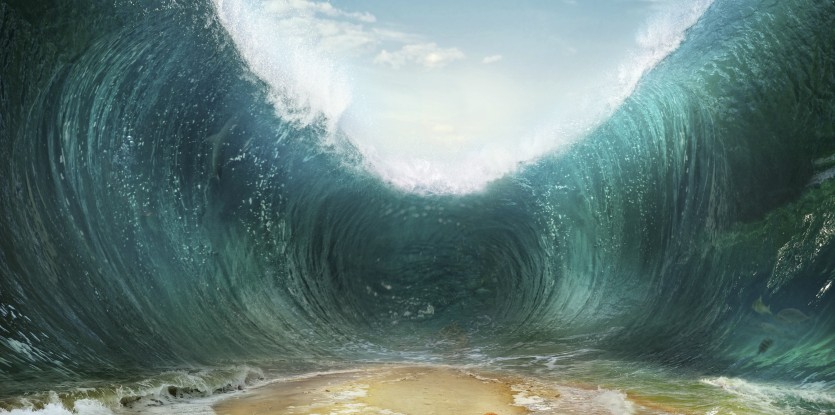
Photo: meaningfullife.com
Black Friday, Brexit and Trumpian Values: Deadly forces taking over our world, controlling our minds
In the year of Brexit and Trump, when "Post-truth" was named word of the year by Oxford Dictionaries, life-enhancing values are becoming more significant than ever.
Black Friday and Thanksgiving!
“A deadly force is taking over our world. This is a monster that can do too much harm to be so commonly welcomed into our society, and it goes by the name “Materialism.” The scariest thing about materialism is that it is so easy to fall into, especially in this day and age. So you ask what is materialism? It is a fixation on and love for material objects over actual living things”…
“How Much Is Enough? What is money and wealth for? Why do we as individuals and societies go on wanting more? What is economic growth for? Can we/ should we carry on just growing, creating, producing, consuming,…,more and more, forever more? Do we need to satisfy our needs or our wants? Should we be a “maximiser” or “satisfier” and choose the path of “enoughness”? Then, what is a good life? What are the main ingredients of a good, happy and peaceful life? Should we move away from Gross National Product (GDP) to Gross National Happiness? What are we here for?”-
In Praise of Frugality: Materialism is a Killer
"Cultivate the habit of being grateful for every good thing that comes to you, and to give thanks continuously. And because all things have contributed to your advancement, you should include all things in your gratitude."-Ralph Waldo Emerson
“The best kind of giving is thanksgiving.”-Chesterton
“Gratitude is not only the greatest of virtues, but the parent of all others.”-Cicero
"Happiness cannot be traveled to, owned, earned, worn or consumed. Happiness is the spiritual experience of living every minute with love, grace, and gratitude.”-Denis Waitley
“At times our own light goes out and is rekindled by a spark from another person. Each of us has cause to think with deep gratitude of those who have lighted the flame within us.”-Albert Schweitzer
"If the only prayer you say in your whole life is “thank you,” that would suffice.”-Meister Eckhart
“The essence of all beautiful art, all great art, is gratitude.”-Nietzsche
Driven by Hope for a Better World: Reclaiming the Common Good
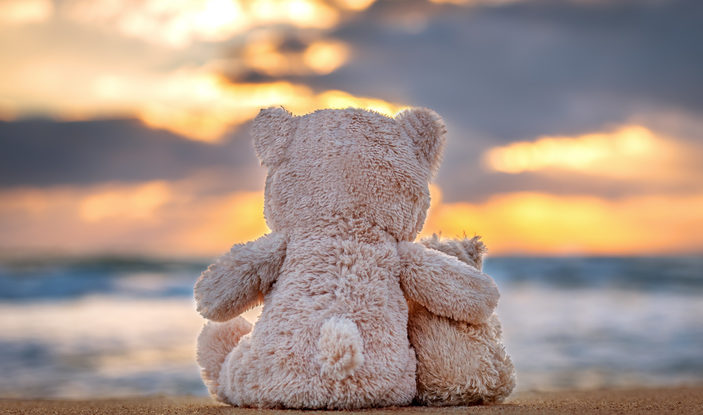
Photo:meaningfullife.com
To defeat the dark forces, and stop their destructive power of manipulation and exploitation, we must begin to contribute to the collective good: We must become for the common good.
To be for the common good is “the ability to understand and share the feelings of another.” Common good is the midah that lays the groundwork for so many vital traits and actions that we all strive for, namely, love of our fellow. Common good is the foundation. It is key to instilling love in our hearts towards our fellow brethren, as it nullifies hate: enabling us to move from darkness to light, despair to hope, and competition to cooperation.
Logic dictates that the inverse of this statement is also true: the absence of the common good can cause a serious deficiency in our capacity to love. Without it, there is nothing to support the best intentions in the world to cultivate goodness. When common good is not within us, the support crumbles, bringing other achievements to the ground. Bullying, bigotry, intolerance, acts of violence, and more all find their roots in the lack of the ability to understand the feelings of another. The resulting apathy can be the breeding grounds for nefarious actions, and more subtle ones as well.
What is this life all about?
Why am I here? What’s my Life’s purpose? How can I make the most of my Life?
The Wisdom Corner
'The links noted below are amongst my Blog postings which are there to provide ideas for inspirational stories for everyone, encouraging contemplation, soul searching and spiritual enrichment.
Whenever you get a chance, please take a few minutes to watch, listen and read some of the amazing narratives below: They are some examples of the many gems I have discovered in my life journey from the wisdom of others. They have opened new horizons in my life. For that I cannot be grateful enough.
